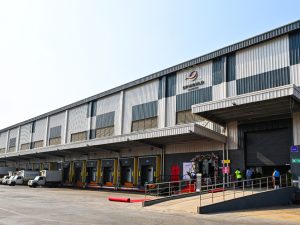DP World has launched a cutting-edge, sustainable cold chain warehouse in Taloja, Navi Mumbai. The 1,10,000 sq. ft. grade-A warehouse features 11,000 pallet positions and supports multiple temperature zones to ensure the secure and efficient movement of perishable and temperature-sensitive cargo. Located just 8km from the Taloja-Dombivli Road and close to the Navi Mumbai Airport (39km), JNPA Port (43km), and key container freight stations (40km), the facility is well placed to serve Mumbai, Navi Mumbai, and Western Maharashtra. Equipped with advanced temperature control technology and next-generation refrigeration systems, the facility uses sustainable refrigerants to enable precision cooling, energy efficiency, and reduced emissions. It can cater to a wide range of temperature-sensitive products, including dairy, frozen foods, seafood, meat, pharmaceuticals and perishable agricultural produce. The new facility reinforces DP World’s commitment to transforming India’s logistics landscape and supporting the evolving needs of the pharmaceuticals, FMCG (dairy, frozen food, perishable agriculture products), and quick-service restaurant (QSR) sectors. Anoop Chauhan, Vice President – Contract Logistics and Cold Chain, DP World Subcontinent said: “With rising demand for high-quality food and healthcare logistics, our new cold chain facility in Taloja delivers a future-ready solution to businesses. It combines sustainability, connectivity, and technology to help businesses grow in India’s evolving consumption landscape”. The facility has been designed to the highest standards of safety, hygiene and compliance, meeting all regulatory standards for food and healthcare goods. Key safety features include a dedicated pump room, high-performance fire protection systems, rockwool insulation, thermal-sealed architecture, and round the clock surveillance. The warehouse is also equipped with temperature and humidity monitoring alarms and real-time environment tracking. Together, these systems provide comprehensive cargo protection ensuring sensitive materials remain secure and stable throughout …
Read More »‘Invest in capacity-building to help remain agile’
Stéphane Graber, Director General, FIATA said, “FIATA is responding by modernising industry standards—such as through the development of the electronic FIATA Multimodal Transport Bill of Lading—and by strengthening dialogue with international organisations to ensure that policy developments reflect operational realities. We are also investing in capacity-building to help our members remain agile in a fast-changing environment.”
Read More »‘Freight rates on routes like Delhi–Frankfurt & Mumbai–London will rise by 10–20%’
Kamal Jain, Director, Cargomen Logistics said, “The temporary closure of key airports in Northern India—Amritsar, Srinagar, and Pathankot—has significantly disrupted cargo operations. Domestic shipments face rerouting delays, transshipment issues and pressure on alternate hubs like Delhi and Jaipur. International cargo, especially perishables, pharmaceuticals, and electronics, is severely impacted due to missed connections and ground handling congestion. Airspace restrictions over Pakistan have forced Indian airlines to take longer routes via the Arabian Sea or Central India, increasing fuel costs and turnaround times. As a result, freight rates on major routes like Delhi–Frankfurt and Mumbai–London will rise by 10–20%, with shippers exploring sea-air and land alternatives.
Read More »ACFI hosts session on cold chain packaging solutions
The Air Cargo Forum India (ACFI) organised a program focusing on the Cold Chain Packaging Solutions in Hyderabad on 8 May. “It was a resounding success, with participation from over 100 industry professionals. The organisers thanked their training partner, Envirotainer, and experts for sharing their in-depth knowledge and expertise, which added immense value to the session.”
Read More »‘Indian airlines incurring additional weekly costs of ₹77 crore due to rerouting’
Rajen Bhatia, MD, Tulsidas Khimji said, “The recent escalation in India-Pakistan tensions has led to significant disruptions in both domestic and international cargo movement. Time-sensitive cargo, including pharmaceuticals, perishables and e-commerce shipments, is experiencing delays or rerouting. Northern states like Punjab, Haryana, Jammu & Kashmir, and parts of Uttar Pradesh, which are logistics hubs, are particularly affected. With air routes compromised, there’s an increased reliance on road and rail transport. This shift may lead to overburdened highways, delayed deliveries and increased costs. Numerous airlines have rerouted or canceled flights to avoid the affected airspace. This includes long-haul flights that typically traverse the region’s airspace. Indian airlines are incurring additional weekly costs of approximately ₹77 crore due to rerouted international flights from northern cities. The cumulative monthly operational impact could exceed ₹306 crore. There may be an increase in insurance claims due to cargo delays or spoilage. The ongoing situation underscores the far-reaching consequences of geopolitical conflicts on international air travel and cargo movement.
Read More »‘Customers must opt for road transport to move cargo domestically’
Gautham R, Senior Manager – Global Air Freight, Head – Air Freight, India said, “The closure of PAK airspace has any which way impacted the cost of operations of the Indian airlines like Air India, SpiceJet and Indigo. This had not only impacted the flying time and operational cost of Indian Airlines but also the few international carriers like Air France, British Airways, and Swiss Flights, which are followed by Lufthansa, ITA Airways, Lot Polish Airlines and many more, which obviously increased the cost of operations for every airline, which will impact the freight rates till this situation prevails based on the demand. The flights departing from Northern India, especially to Europe and the Middle East, have to take a long route (45 minutes to 1 hour of extra travel time), which will make them carry extra fuel, which affects the payload (reducing the tonnage capacity of cargo that can be carried), which will make airlines increase the cargo rates slowly with no other choice due to operational reasons. Considering the current border tensions, we believe the overall impact may not be too severe when weighed against the safety measures implemented by the Government. Moreover, short-term alternatives are available to navigate the disruption. The greater impact is expected on perishable cargo, especially for domestic shipments with limited shelf life. This season marks the harvest of mangoes, lychees, pineapples, apricots, and other fruits in Northern India—making timely logistics crucial. Given the situation, we recommend that customers opt for road transport to Delhi, from where the cargo can be dispatched both domestically and internationally. The closure of Amritsar airport—an important hub for international perishable cargo movement—has further affected operation.
Read More »‘Freight rates not increased yet. Airlines seek support to manage financial strain & continuity’
Vipin Vohra, Chairman, Continental Carriers said, “The temporary closure of airports in Northern India has disrupted cargo operations and may led to delays, missed connections, and rerouting of shipments via alternate airports. Time-sensitive cargo, including perishables and pharmaceuticals, will face the brunt of these disruptions, and logistics operators are under pressure to maintain service levels amidst limited capacity and rising costs. With longer flight paths and increased fuel consumption due to airspace restrictions, operating costs have risen. However, freight rates have not been officially increased by airlines as of now. They have requested support to manage the financial strain and maintain operational continuity under the current circumstances.
Read More »‘On int’l routes, Etihad Airways, Thai Airways may take over as these won’t require extra fuel’
Sunil Kohli, MD, Rahat Cargo said, “The closure of Pakistan airspace is bound to result in a considerable negative impact on both domestic and international cargo movement thereby consequently resulting in enhanced flight durations and resultant cost escalation on fuel. The longer time taken during the flight operations may adversely affect perishable goods and pharmaceutical shipments since these are time-sensitive with limited shelf-lives. An intake of increased fuel due to longer flight paths may further shrink the cargo capacity. On international routes, some of the airlines, which do not face space closure such as Etihad Airways, Thai Airways & few more, may derive an advantage over the Indian carriers as these won’t require extra fuel without reduction in their space for cargo especially on India-Europe & Gulf sectors. The Indian airlines operating to US/Canada routes may also have to opt for technical halts en-route for refuelling which entail higher costs with pruned cargo capacity. As regards an increase in the airfreights by Indian carriers, it has not yet been overtly done on a published basis. However, due to lesser cargo capacity being available to the exporters, the spot rates offered by the airlines as per practice evidently reflect an escalation justifying the longer routes requiring additional fuel coupled with the vital factor – higher demand & lesser space.
Read More »‘With route diversion, Western & Southern airports may see load hike, congestion’
C K Govil, President, ACAAI said, “The temporary closure of airports in Northern India and the suspension of airline operations will have a significant ripple effect on both domestic and international cargo movement. Northern India, particularly cities like Delhi, Amritsar, and Srinagar, serves as a vital hub for cargo consolidation and distribution. The disruption of air traffic in these sectors leads to delays in time-sensitive shipments: Industries such as pharmaceuticals, perishables, and e-commerce will face delays, affecting supply chains and commitments. Airports in Western and Southern India may see increased load, leading to congestion and resource strain. Logistics costs are likely to rise due to extended trucking routes, storage at transshipment hubs, and rerouting charges by airlines. Disruption of International Freight Schedules: Freighter operations and belly cargo in passenger flights connecting to international destinations will be impacted, potentially affecting exports and imports, especially to Europe, the Middle East, and the Americas. Customers and forwarders will need to adjust to rapidly changing schedules, which could cause temporary inefficiencies. The closure of Pakistani airspace has forced Indian airlines to take longer routes for international flights, leading to increased fuel consumption and extended flight durations. This has resulted in additional operational costs estimated at approximately ₹306 crore per month. Longer flight paths necessitate carrying more fuel, which in turn reduces the payload capacity for cargo. This limitation affects the volume of goods that can be transported, thereby impacting supply chains and increasing costs. The ongoing Red Sea crisis has disrupted maritime shipping routes, prompting exporters to shift to air freight for timely deliveries. This surge in demand has further strained air cargo capacity, contributing to higher freight rates. While specific figures for the …
Read More »‘Industries dependent on timely delivery like e-com, pharma are particularly affected’
errxes Xerrxes Master, Managing Director, Master Group of Companies said, “The rerouting of flights to avoid Pakistani airspace has resulted in longer flight paths, increased fuel consumption and higher operational costs. For instance, Air India anticipates incurring approximately $600 million in additional expenses over the course of a year due to these detours, prompting the airline to seek government compensation. These increased costs are often passed on to customers, leading to higher freight rates. Additionally, the extended flight durations necessitate adjustments in crew duty times and aircraft utilisation, further escalating operational complexities and costs. The cumulative monthly operational impact on Indian airlines could exceed ₹306 crore, with added costs per flight ranging from ₹5 lakh for Middle Eastern routes to ₹29 lakh for North American routes. The increased freight rates and operational challenges have a cascading effect on the supply chain, potentially leading to delays in cargo delivery and increased costs for businesses relying on air freight. Industries dependent on timely delivery, such as e-commerce, pharmaceuticals, and perishable goods, are particularly affected. In summary, the closure of Pakistani airspace has significantly disrupted cargo operations for Indian airlines, leading to increased freight rates and broader supply chain challenges.” He added, :Delays in time-sensitive goods such as perishables (e.g., fruits, vegetables, dairy, seafood) and pharmaceutical shipments (like vaccines or temperature-sensitive drugs) will face delays or spoilage. E-commerce Slowdowns – companies like Amazon, Flipkart, and logistics partners will struggle to fulfill orders, especially in Northern markets. Manufacturing and inventory bottlenecks: industries depending on just-in-time inventory (like automotive and electronics) will experience raw material shortages or production delays. Redirection to alternative airports: cargo intended for major North Indian hubs like Delhi, Amritsar, or Lucknow …
Read More » Cargo Breaking News
Cargo Breaking News









